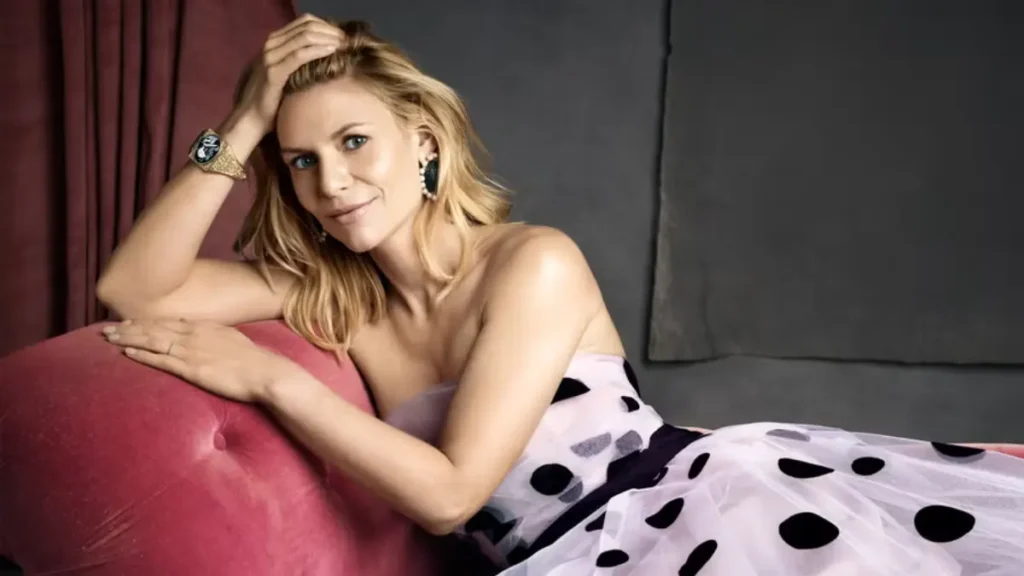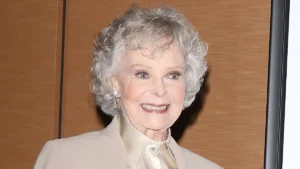Claire Danes’ career spans three decades of breakout roles, award-winning performances, and cultural impact. From her teenage breakthrough in My So-Called Life to her Emmy-winning turn in Homeland, she has built a path that is both steady and remarkable.
She isn’t the kind of star who chases headlines. Instead, she lets the work speak. When audiences still recall her as Juliet opposite Leonardo DiCaprio in Baz Luhrmann’s Romeo + Juliet, and critics celebrate her as Carrie Mathison on Showtime, that’s not a coincidence—it’s consistency.
As Variety once noted, Danes has a rare ability to “age into” her roles, always evolving without abandoning authenticity. That balance makes her timeline more than a list of credits—it’s a story of resilience.
What makes an actress stay timeless in a business built on reinvention? Danes’ career may hold the answer. She has navigated Hollywood’s shifting landscape with quiet steadiness, proving that artistry often outlasts hype.
Rising Stardom in the 1990s
Breakthrough with My So-Called Life (1994)
At just 15, Claire Danes became Angela Chase, the introspective teenager who gave a raw and real face to adolescent life. The ABC series My So-Called Life didn’t run long, but it reshaped how television portrayed teens—awkward, searching, and painfully honest.
Critics immediately noticed. Entertainment Weekly praised Danes for her “astonishing maturity,” while fans latched onto her quiet intensity. Online forums that still circulate today call Angela “the most relatable teen character of the 90s.” That kind of devotion doesn’t fade easily.
The performance also brought Danes her first Emmy nomination—a rare honor for someone barely old enough to drive. Alongside Jared Leto’s Jordan Catalano, her portrayal made the series a cult classic, remembered less for its cancellation and more for its legacy.
Claire Danes’ breakout role came at age 15 in My So-Called Life, earning her an Emmy nomination. But more importantly, it gave audiences a heroine who didn’t look polished or perfect—she looked like them. That connection, even decades later, is why Angela Chase still matters.
First Film Roles and Young Hollywood Spotlight
After My So-Called Life, Claire Danes quickly crossed into film with major early roles. She joined the ensemble of Little Women (1994), holding her own alongside Winona Ryder and Kirsten Dunst. Critics at Variety noted her subtlety, praising how she delivered emotion without overplaying it.
Two years later came the role that sealed her 90s icon status—Juliet in Baz Luhrmann’s Romeo + Juliet (1996). Starring opposite Leonardo DiCaprio, Danes brought quiet depth to a character often overshadowed by spectacle. DiCaprio himself remarked in interviews how she kept the intensity “real” on set, grounding even the wildest moments of Luhrmann’s vision.
What set Danes apart was her lack of Hollywood flash. While other young stars leaned into glamour, she carved out a path defined by emotional honesty. For fans, that made her instantly relatable. For critics, it signaled a performer who would last.
Transitioning into Leading Roles
From Indie Films to Hollywood Recognition
Claire Danes proved her versatility with roles in The Rainmaker (1997) and The Hours (2002). Moving from teen star to serious actress, she leaned into projects that demanded nuance rather than easy charm.
In The Rainmaker, directed by Francis Ford Coppola and adapted from John Grisham’s novel, critics praised her restraint in a role that could have been overshadowed by courtroom theatrics. She showed that subtle emotion could carry as much weight as high drama.
By the time she appeared in The Hours, alongside Nicole Kidman and Julianne Moore, Danes had earned recognition as a performer who could hold her own in ensemble casts. A co-star once noted how she arrived “completely prepared,” yet still flexible, a balance that made her presence feel grounded.
These films marked a turning point—proof that Danes wasn’t just surviving Hollywood’s churn of young talent. She was building credibility, step by step, in stories that mattered.
How Claire Danes Balanced Education and Fame
At the height of her early fame, Claire Danes did something unusual—she stepped away. Instead of chasing every Hollywood script, she enrolled at Harvard University in Cambridge, Massachusetts.
She studied psychology, a choice confirmed in multiple interviews and profiles—not gossip. It was a rare pause that showed she valued intellectual growth as much as screen time.
The decision wasn’t just about academics. It also gave her space to reset, away from the relentless pace of film sets. For a young actress, that move carried weight—it meant prioritizing balance over burnout.
Claire Danes briefly paused acting to study psychology at Harvard. How many stars would risk slowing their momentum for the sake of education? That question still defines her as an actress who plays by her own rules.
The Homeland Era and Global Recognition
Emmy-Winning Performance as Carrie Mathison
When Homeland premiered on Showtime in 2011, Claire Danes redefined her career. As CIA officer Carrie Mathison, she brought both brilliance and fragility to the screen, portraying a character battling bipolar disorder while navigating high-stakes intelligence work.
The performance was more than compelling television—it was award-winning. Danes won back-to-back Emmys in 2012 and 2013, alongside multiple Golden Globes, cementing her as one of TV’s most respected actresses. The Guardian praised her “fearless intensity,” while The New Yorker highlighted her ability to balance emotional breakdowns with razor-sharp focus.
To prepare, Danes researched mental health with medical experts, ensuring the role carried authenticity. Co-star Damian Lewis recalled her “total commitment,” while Mandy Patinkin called her work “a study in courage.” Those details made Carrie feel real, not scripted.
Claire Danes won back-to-back Emmys for her role as Carrie Mathison in Homeland. More importantly, she gave audiences a complex heroine who was messy, brilliant, and unforgettable.
How Homeland Shaped Her Career Legacy
Homeland didn’t just give Claire Danes her most decorated role—it reshaped how audiences saw women in intelligence dramas. Carrie Mathison was brilliant yet flawed, a character whose vulnerability was not hidden but central to her strength. That portrayal sparked wider conversations about mental health on television.
Critics noted that Danes helped move prestige TV into new territory. By embracing the chaos of Carrie’s bipolar disorder, she pushed storytelling past the polished heroes of earlier spy dramas. Showtime executives often credited her performance with keeping the series grounded, even when its plots grew global and complex.
Her impact can be measured against peers. Elisabeth Moss in The Handmaid’s Tale and Gillian Anderson in The X-Files also broke barriers, but Danes’ Carrie blended intelligence work with emotional volatility in ways few others dared.
For Danes, Homeland was both a career peak and a cultural reset moment. It ensured her legacy wasn’t tied only to the 90s—it carried forward into a new era of television.
Awards, Accolades, and Industry Recognition
Complete Awards Timeline
Over the years, Claire Danes has built an impressive list of honors across television and film. Her award history shows not just longevity, but consistent excellence.
She has earned three Primetime Emmy Awards, all tied to her powerhouse performance in Homeland. Alongside that, she has collected four Golden Globe Awards, beginning with her recognition for My So-Called Life in the mid-90s.
Her work has also been acknowledged by the Screen Actors Guild Awards, where she received nominations highlighting her strength in ensemble storytelling. According to IMDb and the Academy of Television Arts & Sciences, Danes’ career accolades continue to place her among television’s most decorated actresses.
Claire Danes has won three Emmys and four Golden Globes. That track record reflects both critical acclaim and the lasting impact of her roles.
The Roles That Defined Her Craft
Certain characters shaped Claire Danes’ reputation as a transformative actress. Each role brought a different milestone, and together they map her evolution.
As Angela Chase in My So-Called Life, captured the messy honesty of adolescence, a performance still celebrated decades later. Her turn as Juliet in Baz Luhrmann’s Romeo + Juliet showed a more mature side, balancing Shakespearean intensity with 90s energy.
Then came Carrie Mathison in Homeland, the role that earned her three Emmys and global recognition. In interviews, Danes has said Carrie was “terrifying and exhilarating to play,” proof of how much the role demanded.
These performances remind us why critics often call her one of the most versatile actresses of her generation. Each character added depth to her career—and each left a mark on audiences.
Beyond the Screen: Influence and Industry Impact
Contributions to Women-Centered Storytelling
Across her career, Claire Danes consistently chose roles that put complex women at the center. From Angela Chase’s restless adolescence to Carrie Mathison’s unstable brilliance, her characters refused easy stereotypes.
Cultural critics, including essays in The New Yorker, have pointed out how Danes helped expand space for flawed yet powerful women in television. Homeland in particular offered a heroine who wasn’t polished, but profoundly human.
Claire Danes consistently portrayed layered, complex women, influencing TV’s representation. In doing so, she contributed to a broader feminist shift in Hollywood storytelling—one where women drive the narrative rather than orbit around it.
Endorsements, Public Presence, and Media Voice
Claire Danes has balanced glamour with grounded authenticity. She has graced the covers of Vogue and Vanity Fair, photographed as both a fashion icon and a serious artist. These features shaped her public image without overshadowing her acting.

Outside the spotlight, she has supported philanthropic causes, including advocacy for children and global initiatives tied to the UN. Her ability to lend her voice without chasing attention adds to her trustworthiness as a public figure.
Comparing Career Trajectories with Peers
Claire Danes vs Cate Blanchett, Nicole Kidman, Julianna Margulies
Compared to Cate Blanchett and Nicole Kidman, Claire Danes maintained steady TV dominance while her peers built more film-heavy legacies. Julianna Margulies offers a closer match, with both actresses leading prestige television dramas that earned awards and cultural impact.
Here’s a quick comparison of their trajectories:
| Actress | Strengths | Awards & Recognition | Career Focus |
| Claire Danes | Emotional intensity, TV lead | 3 Emmys, 4 Golden Globes | Prestige TV (Homeland) |
| Cate Blanchett | Versatility, global presence | 2 Oscars, multiple Golden Globes | Film & stage |
| Nicole Kidman | Star power, longevity | 1 Oscar, Emmy, Golden Globes | Film & limited series |
| Julianna Margulies | Strong TV lead, consistency | 3 Emmys, Golden Globe | TV (ER, The Good Wife) |
Why Danes’ Career Is Considered Underrated
Despite her awards and longevity, Claire Danes is often labeled underrated. Critics from The Guardian and Vulture have argued that her consistency may be the reason—quiet brilliance rarely draws the same spotlight as reinvention.
Is consistency less glamorous than reinvention? Danes built a legacy of steady excellence, yet Hollywood conversations often celebrate louder, riskier arcs. That contrast makes her career both overlooked and quietly extraordinary.
Claire Danes’ Enduring Hollywood Legacy
Looking back, Claire Danes’ Hollywood journey is defined by resilience and quiet brilliance. She never chased every spotlight, yet she stayed relevant across three decades of shifting trends. From Angela Chase’s angst to Carrie Mathison’s chaos, her characters captured the depth audiences rarely forget.
Unlike many peers, Danes built a career that balanced professional acclaim with personal steadiness. Her marriage to actor Hugh Dancy and their family life show a star who values stability as much as recognition. Even during her return in Fleishman Is in Trouble, she reminded viewers that her artistry remains sharp, not dulled by time.
She isn’t the loudest name on red carpets, and maybe that’s the point. Claire Danes’ legacy is one of resilience, consistency, and quiet brilliance. In a world that often rewards reinvention, she proves that staying true can be just as powerful.
FAQs About Claire Danes’ Career
What was Claire Danes’ breakthrough role?
How many awards has Claire Danes won?
What role is Claire Danes most famous for?
Did Claire Danes ever take a break from acting?
Is Claire Danes still acting today?
Nishant Wagh is the founder of The Graval and a seasoned digital journalist with over 15 years of experience covering entertainment, media, and culture. He specializes in breaking news and trending stories told with accuracy, context, and depth.





5 thoughts on “Claire Danes Career Timeline: Every Breakthrough, Award, and Hollywood Milestone”